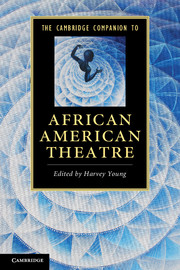Book contents
- Frontmatter
- Contents
- Illustrations
- Contributors
- Acknowledgements
- Chronology
- Introduction
- 1 Slavery, performance, and the design of African American theatre
- 2 Slave rebellions on the national stage
- 3 Early black Americans on Broadway
- 4 Drama in the Harlem Renaissance
- 5 The Negro Little Theatre Movement
- 6 African American women dramatists, 1930–1960
- 7 Amiri Baraka and the Black Arts Movement
- 8 Fragmented musicals and 1970s soul aesthetic
- 9 Spectacles of whiteness from Adrienne Kennedy to Suzan-Lori Parks
- 10 African American performance and community engagement
- 11 Women playwrights who cross cultural borders
- 12 African Diaspora drama
- 13 Black theatre in the age of Obama
- Further reading
- Index
- References
12 - African Diaspora drama
Published online by Cambridge University Press: 05 December 2012
- Frontmatter
- Contents
- Illustrations
- Contributors
- Acknowledgements
- Chronology
- Introduction
- 1 Slavery, performance, and the design of African American theatre
- 2 Slave rebellions on the national stage
- 3 Early black Americans on Broadway
- 4 Drama in the Harlem Renaissance
- 5 The Negro Little Theatre Movement
- 6 African American women dramatists, 1930–1960
- 7 Amiri Baraka and the Black Arts Movement
- 8 Fragmented musicals and 1970s soul aesthetic
- 9 Spectacles of whiteness from Adrienne Kennedy to Suzan-Lori Parks
- 10 African American performance and community engagement
- 11 Women playwrights who cross cultural borders
- 12 African Diaspora drama
- 13 Black theatre in the age of Obama
- Further reading
- Index
- References
Summary
In an anthology of criticism about African American theatre, an essay about African Diaspora drama may initially seem out of place because many of the authors and plays that can be grouped under this heading originate from and concern life outside the United States. Yet the inclusion is appropriate, for self-identification as black has always exceeded the nation-state. While the Jamaican born, Harlem Renaissance poet Claude McKay lamented that his “long-suffering race … denied a human place” both in the “Christian West” and on the African Continent had, in fact, “no home on earth,” “enslaved” people of African descent have sought to identify and create a home: that is, a material and psychic space where their worth is acknowledged. “Diaspora” has functioned as a concept that has allowed them to posit a space of nurturance in the world. Indeed, as I will demonstrate, many African American playwrights, theorists, and audiences have not only posited emotional and political links with non-US black populations but have also looked outside these geographical confines for aesthetic concepts to guide their construction of theatre.
Despite a dehumanization that has persisted since the sixteenth-century establishment of the transatlantic slave trade, ideas concerning African or black solidarity have assumed many forms over historical time. Beginning with a review of ways in which the African Diaspora has been conceptualized, I propose several different categories of African Diaspora drama. The first two build upon the pioneering scholarship of W. E. B. Du Bois and Melville Herskovits, while the others reflect my own practices, developed over years of study and teaching. My objective is to identify ways in which similarity and difference – the paradoxical poles around which diaspora is enacted – have been articulated. I concentrate on written texts because up until relatively recently, these dramas circulated more easily than performers or videotape, and YouTube was non-existent. Though the African Diaspora is multilingual, this chapter concentrates on texts readily available in English.
- Type
- Chapter
- Information
- The Cambridge Companion to African American Theatre , pp. 230 - 254Publisher: Cambridge University PressPrint publication year: 2012
References
- 1
- Cited by



